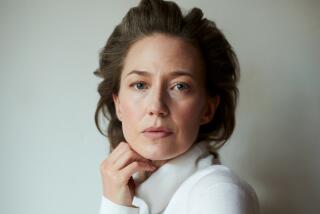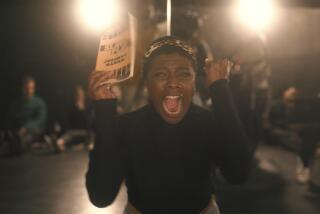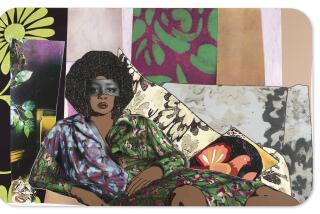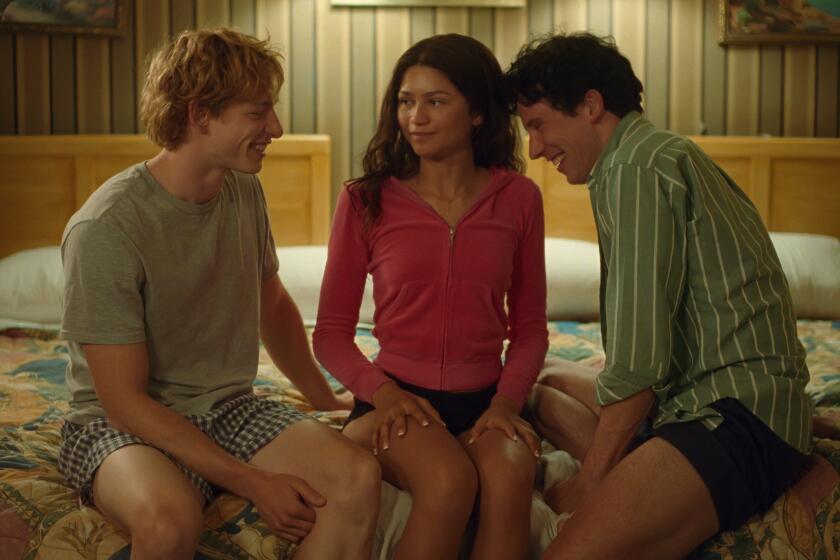Lynn Nottage wants ‘Vera Stark’ to be a conversation starter
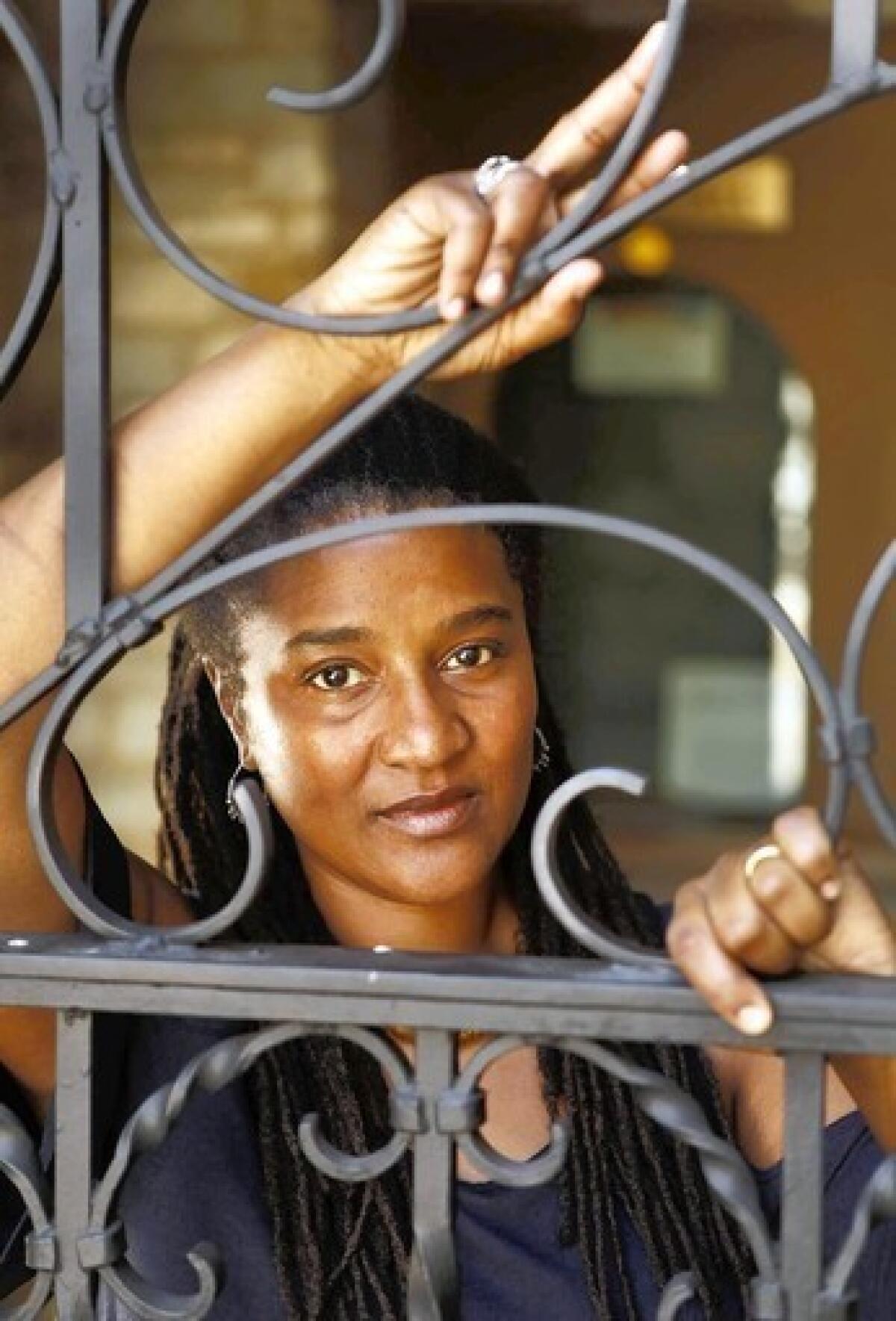
You’ve probably never heard of the African American actress whose film career and life are dramatized in Lynn Nottage’s play”ENMV0002398”>”By the Way, Meet Vera Stark.”
Don’t feel bad: Plenty of serious film buffs haven’t, either.
Google the name and you’ll turn up a documentary by scholar Herb Forrester, “Rediscovering Vera Stark,” which includes a clip from her film “The Belle of New Orleans” (1933), a handful of photographs and some speculation about her mysterious fate. Not a lot else.
For Nottage, such yawning gaps in the historical record lend poignancy to flickering images of black actresses in ruffled maids’ costumes, dropping off trays of hors d’oeuvres in the 1930s screwball comedies she loves. (She cites “My Man Godfrey” from 1936 as “one of my favorite films in the world.”)
“I love the sensibility, I love the quick pace of the humor, I love the irreverence of those 1930s films, but …” She takes a breath. “The thing that always bothered me is that you’d have these very talented African American actresses who would pop on in these bit roles for two minutes, literally, and disappear.”
Who were they? What were their lives like? What happened to them?
“For a lot of them the trail really ends cold,” explains Nottage, 47, who lives in Brooklyn but has come to L.A. for the first week of rehearsals for the play, which will make its West Coast premiere at the Geffen Playhouse Sept. 26. “They just sort of disappeared from Hollywood, and you can’t find out. The trail for others is that they ended up destitute and forgotten.”
Although Vera Stark’s career path resembles those of other black actresses of her era, such as Theresa Harris, Hattie McDaniel, Louise Beavers and Nina Mae McKinney, there is one crucial difference: Vera Stark is a fictional character.
So is Herb Forrester, the putative creator of the “Rediscovering Vera Stark” website. The site is a tongue-in-cheek spoof created by Nottage and a team of collaborators — including director Peter Bogdanovich, whose deadpan commentary is a highlight of the documentary. (Nottage is friends with his daughter.)
Nottage explains, “A lot of people who came to see the play in New York didn’t realize that Vera isn’t real. And they wanted to find out who she is.”
She conceived the website (and another soon to follow) not to hoodwink people but to “allow them to play the game. Vera may not be a real person, but she is a reflection of many people. She’s a composite of a lot of actresses. Her circumstances are real.”
Upon first acquaintance elegantly beautiful and intimidatingly serious, Nottage breaks into a warm, infectious giggle as she adds, “Interestingly enough, somebody went to Herb Forrester’s site and he got invited to lecture at the New York Film Academy. We had to say, ‘Unfortunately, he’s a fictional character.’”
Nottage, a prolific playwright with multiple awards including the 2009 Pulitzer Prize for drama (for “Ruined”) and a MacArthur “genius grant,” has been storing up the observations and reflections that inform “Vera Stark” all her life, since she was a child watching black-and-white movies on TV after school.
During the 1990s, while living on 110th Street in New York City, Nottage and her husband ran into Butterfly McQueen, best known as Prissy in “Gone With the Wind,” in a grocery store.
“My husband says, ‘Are you Butterfly McQueen?’” recalls Nottage. “And she said with that sort of precious little voice she has, ‘Yes,’ and she was just so delighted that anybody recognized her. Her face just totally lit up. I mean, here’s this woman who’s sort of an indelible part of film history, wandering the aisles of the supermarket.”
For audiences who saw “Ruined” at the Geffen in 2010, “Vera Stark” may look like a radical departure.
“Ruined,” set in a brothel in Uganda, is based on interviews Nottage and director Kate Whoriskey did with Congolese women brutally victimized by military turmoil, while “Vera Stark” is a bubbly, glamorous comedy set in old Hollywood. It includes a clip from the (fictional) film “The Belle of New Orleans,” in which director Jo Bonney and her cast have a great time with the cinematic conventions of the 1930s.
There are some unifying themes, though. As Nottage observes, a through-line in her diverse oeuvre is “my focus on African American women, or women from the African diaspora, who’ve been marginalized by circumstance and who are trying to assert their presence.”
From this rather heavy-sounding premise she crafts plays that charm audiences.
In his 2010 review of “Ruined,” Times theater critic Charles McNulty wondered, “How does the playwright manage to get us to pay attention to what the nightly newscasts only flittingly report for fear of losing viewers? She concentrates on the women not as generalized victims but as individual survivors, with specific histories, longings, strengths and shortcomings.”
“If you lead with the anger, it will turn off the audience,” Nottage observes. “And what I want is the audience to engage with the material and to listen and then to ask questions. I think that ‘Ruined’ was very successful at doing that. People had a very rich, complicated emotional experience that forced them to read newspapers differently, so that when a headline about Congo came up, rather than flipping past it, they would engage with it.
“And that’s what I’m asking with ‘Vera Stark,’ that next time you see one of those films, you be conscious of the politics of the film and of Hollywood at the time,” Nottage says.
And, of course, of Hollywood today.
“If you speak to any African American actress, I think that they will echo a lot of themes in the play,” Nottage points out. “I mean, for God’s sake, Kerry Washington is the first African American woman in 30 years to star in a prime-time show on a network. In 30 years, you know? We have a black president!”
Sanaa Lathan, who originated the role of Vera Stark in New York and is reprising it here, remembers that she “got goose bumps” when she read the script. “There are two levels to it, how it does echo the reality of women in Hollywood. I mean, the things that these characters are talking about are the conversations that my friends and I have every day. And then on the actress side, what a delicious role, what a delicious arc! I mean, how often do you get to play a young, innocent 20-year-old in the 1930s and go all the way to the bitter, 68-year-old alcoholic in the 1970s.”
Lathan has acted extensively in movies and on TV as well as on stage. “Just in terms of my personal experience, I feel like I’ve had a great variety of roles. But I do have to say that people don’t really get it, until either you are an African American in this business, or you’re representing an African American. When my agent, my Jewish agent, came to the show, he was so moved. He was like, ‘Sanaa, it hasn’t changed!’ He probably gets more of it than I do, since I try to focus on the yeses and ignore the noes. You can’t get bitter — otherwise you’ll end up like Vera.”
“People were surprised by how funny the play is,” adds Lathan. “It’s not an angry diatribe. You’re laughing and then you’re like, ‘Oh, my God.’”
Director Bonney, who also directed the world premiere at New York’s Second Stage Theatre, says she was attracted not only by the originality of the play’s subject matter but by its ambition and theatricality. “Lynn leaves it to the director to figure out all the conventions of it, how to pull off all the different elements. It was a challenge, which is always fun.”
“Ruined” and “Vera Stark” had extended runs in New York, and both provoked significant Broadway buzz, but neither has gone to Broadway.
“I’ve been asked a lot why didn’t ‘Ruined’ go to Broadway,” says Nottage. “It was the most successful play that Manhattan Theatre Club has ever had in that particular space, and yet we couldn’t find a home on Broadway. I was repeatedly told that there isn’t an African American woman who can open a show on Broadway. I said, ‘Well, how do we know? How do we know if we don’t do it?’ I said, ‘I think you’re wrong.’”
For one thing, she points out, “African American women in particular have incredible buying power. Statistically, we go to the movies more than anyone. We have made Tyler Perry’s career. His films open with $25 million almost consistently. So I think there are still some frontiers.”
Her hope for “Vera Stark” in L.A. is that it “will open a conversation. That’s what the play was designed to do.” And of course, she “would be open” to a Broadway run.
She has experienced firsthand the media’s power to change prejudices and, literally, open doors.
For years after she and her husband, filmmaker Tony Gerber, who is white, got married, his grandmother wouldn’t invite them over for fear of “what her neighbors would say.”
“Then she began watching Oprah,” Nottage says, “and Oprah became her best friend, and in some way because she invited Oprah into her home, I was welcome. I never would have seen the inside of that woman’s home without Oprah.”
Winfrey recently considered starring in an HBO movie of “Ruined.” The project ultimately “didn’t work out,” says Nottage. Which is, after all, a very Hollywood outcome — like something out of the play “By the Way, Meet Vera Stark.”
More to Read
The biggest entertainment stories
Get our big stories about Hollywood, film, television, music, arts, culture and more right in your inbox as soon as they publish.
You may occasionally receive promotional content from the Los Angeles Times.
